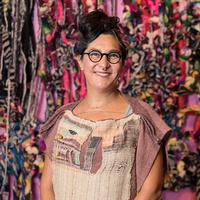As told to Grashina Gabelmann, 1614 words.
Tags: Radio, Film, Beginnings, Process, Money, Collaboration.
On staying curious about the everyday
Documentary filmmaker and radio producer Bianca Giaever discusses telling other people's stories, being realistic about what you make, and art as an act of care.What is your artistic practice?
I’m a filmmaker and I’m a radio producer, and I make a podcast called Constellation Prize. I’m interested in documenting people’s everyday lives and inner worlds, particularly the everyday lives of strangers. Radio is the medium, but I do think of it as performance art in a way.
Can you elaborate?
I start with a concept, instead of a character, and the audio content is documentation of me going through with that content. First I follow my compulsion to do something, and then I spend the editing process asking myself “Why did I feel compelled to do this?”
I’m inspired by performance artists as much as I am by radio producers, in terms of finding that concept. In my Crossing Guard profile, for example, I was inspired by Sophie Calle’s pieces about following strangers, like when she interviewed people from an abandoned address book she found, or followed a stranger all the way onto his flight to Austria.
I’m always trying to put myself into surprising and unexpected situations, because I know this makes a good radio story, and it also makes life more interesting.
Is there a collaboration between you and the person you are documenting?
Yes. I’m looking for a creative spark in the subjects I choose, and I’m asking for their ideas and their input throughout the process. I want to hear what’s going on in their mind, and what they think the end of the story should be. I’m looking for someone who inspires me as a subject and who seems like they’re looking for a creative outlet in their life.
Yes, it does seem like you’re really involved, more than just someone recording a story. Is this element of performance art liberating?
It is. I think journalism and art can both be exploitative—telling someone else’s story is a totally weird thing to do. But I find it liberating to talk about this exploitative nature of it more openly, to invite it into the process. I’m talking about that with my Subjects in the piece, and I’m trying to be as transparent as possible. I always say, “I don’t know what I’m doing. I’m an artist. Here’s my past work. Here are the loose themes I’m interested in. Maybe nothing will come of this.”
Someone gave you the advice that good writing is just saying facts, right? This was quite an epiphany for you.
Jay Allison said that to me. It reminds me of. Another podcast person I love, Erica Heilman, who wrote an entire book without adjectives. When she told me about it she was like, “The adjectives just felt wrong. Every time I wrote a sentence with an adjective, the sentence just seemed better without it. The adjective made it too flowery somehow.” Everyone has different styles, but one thing I appreciate about audio is that people tend to write in clear simple sentences, which is a style that resonates with me. And the writing just seems to be better when it’s fact based, and detailed based, almost like good legal writing. When you’re starting out, there’s a tendency to make your writing too grand or showy. You do the scene a disservice that’s avoided by just stating the facts.
It shows you are putting trust into the story you’re telling and then the listeners can also trust you.
I think the scene I was writing at the time was about breaking up with my boyfriend and I could have been like “I was so sad,” and taking on the difficult task of describing the feeling of sadness. But the better way to describe it ended up being a description of me taking our bookshelf apart, and separating our books that had been so lovingly pressed together. That scene, those facts, showed why the separation was so painful.
Radio is so visual, without actually being visual.
I do think about the radio story as an image—as a blank canvas that exists in a person’s mind. With every sentence of the story I’m filling in the canvas, and as I’m editing I’m constantly imagining the film that’s playing in people’s heads. That’s how I decide what should stay in or get cut, I’m curating that image.
Have you ever spent loads of time collecting stories from one person and had to kill the story?
Yeah, definitely. I kill stories all the time. Usually, I’m able to kill the story before I get too deep when it’s one of my own pieces. When I’m making stories for other outlets, editors will sometimes kill stories late in the process, and that feels really bad. That’s why as I get older, I more just want to do my own work for my own podcast, because editors killing my stories is so heartbreaking.
It must be so hard to tell your subject that their story has been killed.
Yes. It’s like, “My editor, who lives a thousand miles away, just listened to you expressing your most intimate thoughts and decided it wasn’t that interesting.” It’s horrible.
A few years ago when you first started doing commercial work you said that commercial work made you feel like your identity was being Stolen. What’s your relationship to it now?
I’ve been doing commercial work for ten years now to make a living. I think as you get older you realize that you need money, and money in exchange for my artistic choices isn’t such a bad thing. Especially now that we’re in a recession, you get less picky and precious. I’m not saying go against your ethics. But if it’s a company you like, you can even see it as a compliment: They liked my art so much, they are paying me for my creativity. I think selling out is more accepted these days. Everyone is just happy for you that you’re making money, because it’s so hard.
Sadly, there’s not a lot of funding for indie podcasts, and it’s not really appreciated as a real art form. Which means that there are fewer people making them, and less diverse voices because you need to either have a trust fund or a really lucrative side hustle, which I’ve just lucked my way into.
I found it really interesting that you took a summer course a few years ago to study the Bible. You said it made you braver in your storytelling.
Yeah, the Bible is an inexplicable text. I think that’s what makes people keep coming back to it - the desire to understand. I think in audio, and in other mediums these days, there’s a fear around alienating the listeners because of pressures to make money. Everything has to make sense, and everyone has to come away with a “takeaway” nugget of what the story means. The Bible doesn’t follow that formula at all. Not that I think I’m going to make something like the Bible, obviously, but it was a good reframing. Reading the Bible I thought: “Oh, shit, things don’t need to make sense. You don’t need to introduce every character.”
Is that what you’re trying to do with your latest series?
A little bit. There are two experts who come in with no introduction, and even my editor was like, “Say that you talked to some experts, because we don’t know who these random voices are.” And I just left them as random voices. I thought, even if it doesn’t work and people don’t like it, at least I know I tried. If this isn’t a space to try things, then what’s the point?
Have you gotten any feedback on work that hasn’t been super linear?
People have liked it so far, but I don’t think I’ve ever had the courage to go full on art vibes because I’m afraid of losing a listener, to some degree. But I hope to keep experimenting in that direction.
In an interview from a few years ago when asked what your “big life question’ is you said: “What is this?” Is that still your question?
I think “What is this?” is definitely still the question. I’m always impressed with older people who stay open to the world and curious. I’m trying to get my mind to be more open, and more curious, and not get overly cynical or tired. I think the microphone is a good tool to remind you to stay curious and talk to new people.
Do you also see your work as an act of care or have you ever thought of it that way?
I think it’s complicated—I don’t see it as positive 100% of the time. In some moments it can definitely feel caring, but I am also mining them to get a good story, and to enhance my own career. What are they getting out of it? Perhaps making good art is an act of care, for the people who might consume it, or maybe it will actively harm them! Even though there are definitely moments where I’m like, “Wow, we really just connected,” I’m not a therapist. I don’t have any training of that kind. I am doing it because I’m trying to make an interesting story. If something good comes out of it, then that’s great.
Bianca Giaever Recommends:
The Show About The Show—I worship at the altar of Caveh Zahedi.
Painting your car—children will wave to you.
Cross country skiing—gliding your troubles away.
Reading plays with your friends—much easier and more interesting than talking.
Noticing traffic cones—they have great personalities.




